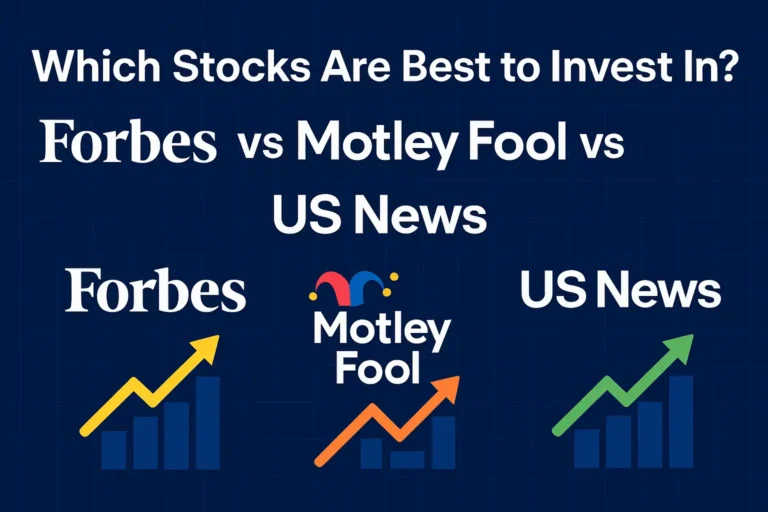
Which Stocks Are Best to Invest In? Forbes vs Motley Fool vs US News
Which Stocks Are Best to Invest In? Forbes vs Motley Fool vs US News
Wondering which stocks are best to invest in right now? This data‑driven guide explains why major outlets like Forbes, Motley Fool, and US News often disagree—and how you can use their picks intelligently to build a smarter portfolio.
Last updated: August 22, 2025 • Read time: ~15–18 minutes
Quick Summary (tap to expand)
Why reputable sources often disagree
Even among respected outlets, stock recommendations diverge because their frameworks, data windows, and risk assumptions are not identical. In practice, a value‑tilted screen can point to cash‑rich blue chips, while a growth‑tilted lens favors innovators with high reinvestment rates—even if earnings are lumpy today. Your job as an investor is to understand the method behind the picks and align it with your time horizon, risk tolerance, and portfolio goals.
Common drivers behind different lists
- Methodology: Factor models (value, quality, momentum), analyst consensus, or editorial judgment.
- Time Horizon: 6–12 month lists can look very different from 3–5 year conviction picks.
- Risk Appetite: Some outlets lean toward quality at a fair price; others embrace disruptors.
- Sector Emphasis: Tech leadership vs. diversified “all‑weather” mixes changes outcomes.
- Update Cadence: Frequently refreshed lists react faster—but can be noisier.
“The stock market is a device for transferring money from the impatient to the patient.”
How to use third‑party picks without outsourcing your brain
Treat each list as an idea funnel, not a blind buy list. Start by sanity‑checking core fundamentals, confirm business quality and cash flows, then gauge liquidity and sentiment—yes, volume dynamics can matter. Finally, translate a pick into a position size that fits your plan. If a name is great but volatile, smaller sizing and staged entries can make it workable.
Remember: the price you pay is a huge part of total return. Learning to separate a company’s intrinsic worth from its market quote is essential—see Understanding the Real Value of a Stock.
What you’ll learn in this guide
- Forbes vs Motley Fool vs US News: where each source shines (and where it doesn’t).
- How to triangulate picks to boost conviction and reduce single‑source bias.
- Practical portfolio construction moves (sizing, diversification, and rebalancing).
- Real examples of winners (and lessons from misses) to shape a repeatable process.
Next up: Forbes Stock Recommendations — how their fundamentals‑first lens shapes the list.
Forbes Stock Recommendations 2025 Outlook
Forbes often highlights companies with solid balance sheets, proven cash flows, and strong industry positions. Their methodology leans toward fundamentals and long-term sustainability, making it a favorite for conservative investors.
How Forbes builds its lists
Unlike some stock-picking services, Forbes usually relies on earnings quality, cash flow stability, and sector leadership when publishing its best-stock lists. Their analysts favor companies with durable economic moats, diversified revenue streams, and the ability to weather recessions. This is why you’ll often see established giants on their lists rather than speculative disruptors.
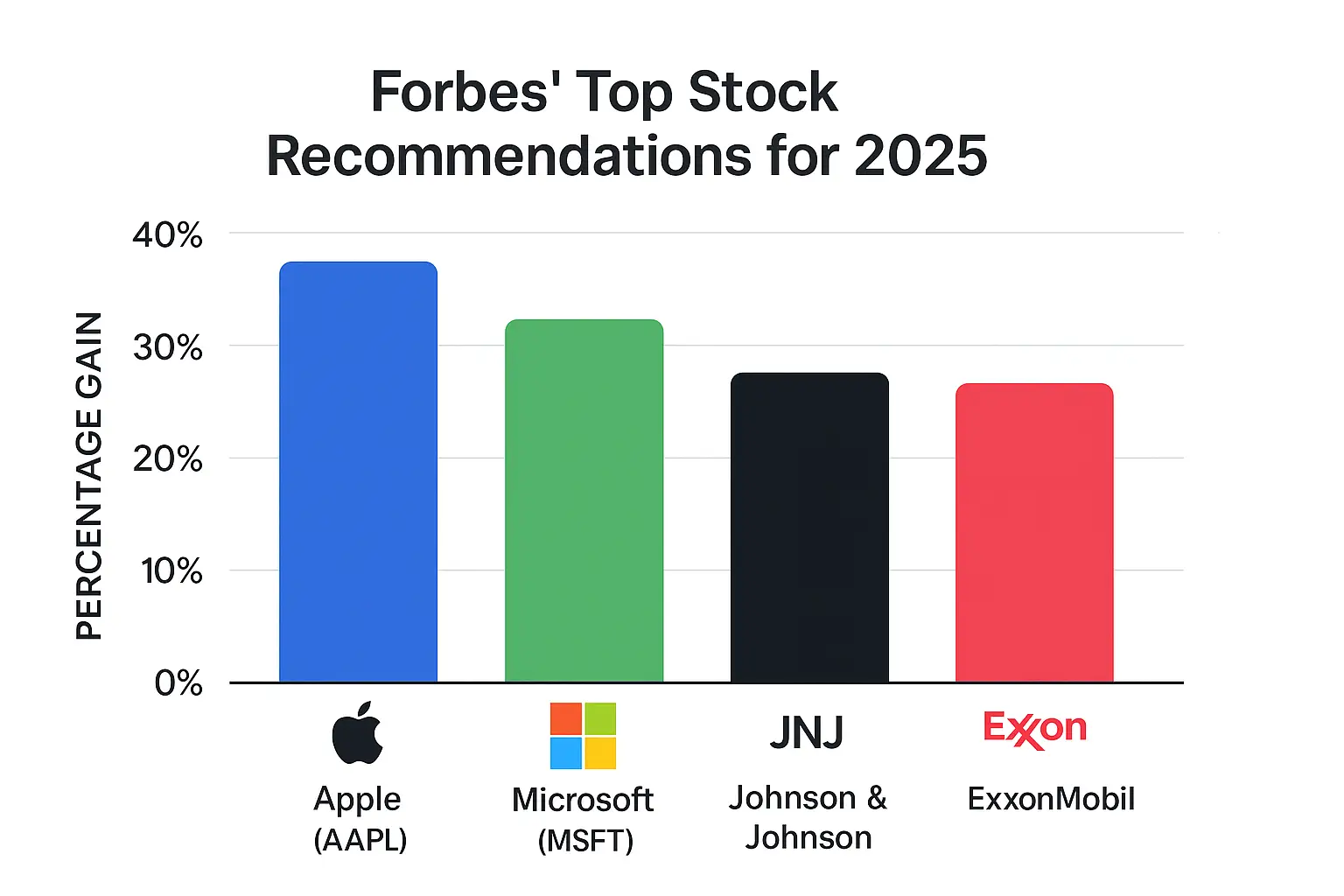
Top 3 Forbes Stock Picks for 2025
- Microsoft (MSFT): Steady earnings, AI leadership, and diversified products.
- Johnson & Johnson (JNJ): Resilient healthcare revenues and dividend reliability.
- ExxonMobil (XOM): Energy sector stability with strong cash flows in a volatile market.
Case Study: Johnson & Johnson Through a Recession
During the 2008 recession, Johnson & Johnson declined less than 30% while the broader market plunged over 50%. Its diversified healthcare portfolio cushioned the fall and dividends kept flowing, proving why Forbes still includes it in their reliable picks.
“Investors should remember that excitement and expenses are their enemies. If they insist on trying to time their participation in equities, they should try to be fearful when others are greedy and greedy only when others are fearful.”
Related reads: Tesla Stock Predictions 2025 and How AI Is Reshaping the Stock Market.
Pros & Cons of Forbes’ Stock Picks
| ✅ Pros | ❌ Cons |
|---|---|
| Focus on stability and proven fundamentals | May overlook high-growth emerging companies |
| Good defensive picks in recessions | Lists update less frequently than other sources |
| Strong dividend track record among recommended stocks | Heavier weighting toward large-cap stocks |
Next up: Motley Fool Stock Recommendations — how a growth-focused lens creates very different picks.
Motley Fool Stock Recommendations Growth-Focused
Motley Fool has built its reputation on uncovering high-growth opportunities before they become mainstream. Their flagship services, Stock Advisor and Rule Breakers, have a track record of identifying stocks like Netflix, Amazon, and Tesla years before Wall Street caught on.
How Motley Fool selects winners
Motley Fool’s analysts prioritize innovation, scalability, and disruptive potential. Unlike Forbes, which prefers stable fundamentals, the Fool is comfortable recommending volatile but transformative companies with the potential to generate 10x returns over time. Their philosophy revolves around long-term compounding, holding stocks for 5–10 years instead of trading frequently.
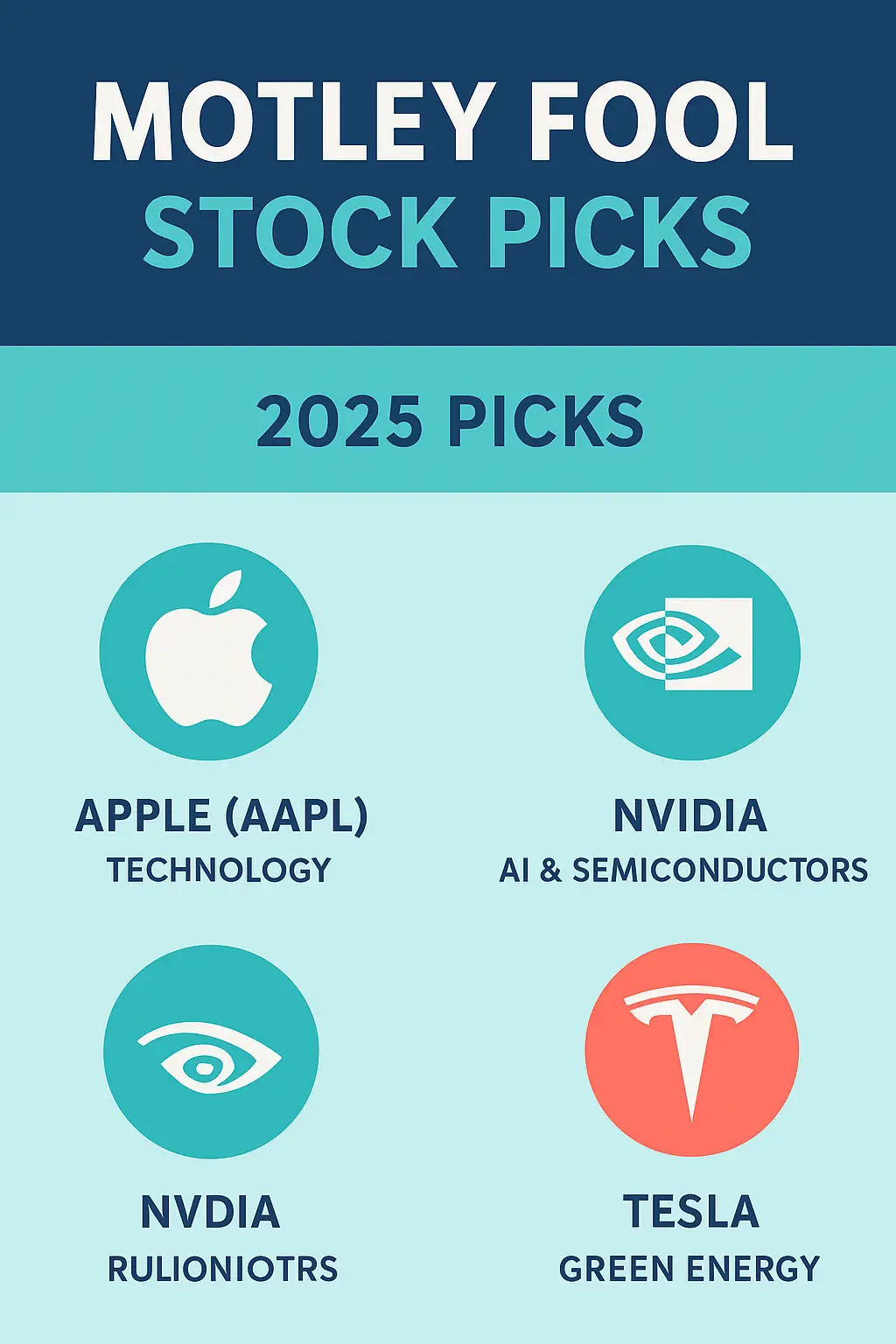
Top Motley Fool Stock Picks for 2025
- Nvidia (NVDA): Dominating AI chips and cloud infrastructure.
- Shopify (SHOP): E-commerce platform with global expansion opportunities.
- Palantir (PLTR): Data analytics leader with government and enterprise contracts.
Case Study: Netflix (NFLX) — A Motley Fool Classic
Motley Fool recommended Netflix in the early 2000s, when it was still mailing DVDs. Investors who followed this pick enjoyed returns of 10,000%+ over two decades. This illustrates the Fool’s strength in spotting disruptors early and holding through volatility.
“Volatility is the price you pay for outsized returns. The key is to stay invested long enough to let compounding work.”
Related reads: Best Day Trading Books and Swing Trading Success Stories.
Pros & Cons of Motley Fool’s Approach
| ✅ Pros | ❌ Cons |
|---|---|
| Focus on innovative, disruptive companies with high upside | High volatility — not ideal for risk-averse investors |
| Proven track record with early calls like Amazon, Tesla, and Netflix | Some picks may underperform for years before paying off |
| Encourages long-term holding, reducing trading costs | Subscription model can be expensive for beginners |
Next up: US News Stock Recommendations — where data-driven rankings highlight stable yet competitive companies.
US News Stock Recommendations Data-Driven Picks
US News & World Report takes a more quantitative approach than Forbes or Motley Fool. Their methodology relies heavily on analyst consensus, earnings stability, and risk-adjusted rankings. The result is a balanced list that appeals to cautious investors who want stocks vetted by multiple data sources.
How US News ranks stocks
US News combines Wall Street analyst ratings, valuation ratios, and growth potential into a scoring model. Companies are judged on financial strength, market performance, and future earnings outlook. Unlike Motley Fool, which champions disruptors, US News often tilts toward steady compounders and sector leaders.
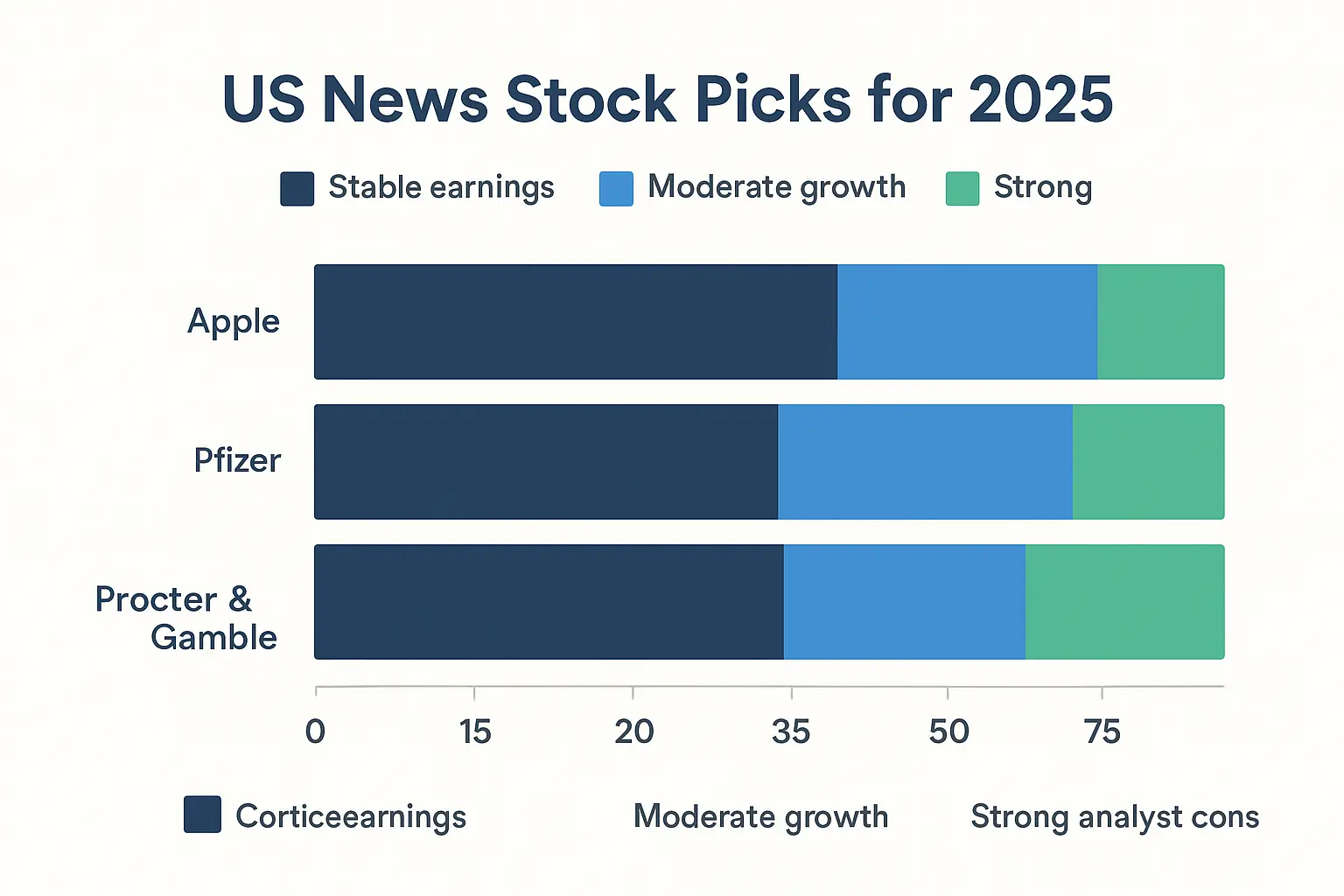
Top US News Stock Picks for 2025
- Apple (AAPL): Strong brand, consistent earnings, and ecosystem advantage.
- Pfizer (PFE): Healthcare innovation with reliable dividends.
- Procter & Gamble (PG): Consumer staples resilience in any market cycle.
Case Study: Apple’s Consistency
US News has repeatedly highlighted Apple as a top pick. Between 2018 and 2023, the stock gained over 200% while continuing to deliver record-breaking buybacks and dividends. This demonstrates US News’ strength in spotlighting dominant incumbents with durable earnings power.
“In the short run, the market is a voting machine, but in the long run it is a weighing machine.”
Related reads: Daily Stock Picks and Top Stock Alerts.
Pros & Cons of US News’ Rankings
| ✅ Pros | ❌ Cons |
|---|---|
| Heavily data-driven and objective | Less focus on innovative disruptors |
| Emphasizes stability and analyst consensus | May miss early growth stories like Tesla or Nvidia |
| Good for investors seeking defensive picks | Picks may overlap heavily with S&P 500 |
Next up: Head-to-Head Comparison — where we put Forbes, Motley Fool, and US News side by side.
Forbes vs Motley Fool vs US News Head-to-Head
Now that we’ve reviewed each outlet’s approach, let’s put them side by side. By comparing their methodologies, track records, and investor fit, you’ll see where each shines and where caution is warranted.
Methodology Comparison
Each source uses a unique lens to evaluate stocks:
- Forbes: Fundamentals-first, emphasizing earnings and dividends.
- Motley Fool: Growth and disruption, betting on innovative companies.
- US News: Data-driven rankings, guided by analyst consensus and risk-adjusted scoring.
At a Glance
| Criteria | Forbes | Motley Fool | US News |
|---|---|---|---|
| Track Record | ✅ Solid with defensive stocks | ✅ Legendary for growth picks (Amazon, Netflix) | ✅ Reliable, consistent analyst picks |
| Risk Level | ❌ Low risk, slow upside | ❌ High volatility | ✅ Balanced |
| Update Frequency | ❌ Quarterly | ✅ Monthly | ✅ Regular refreshes |
| Investor Fit | Conservative, dividend-focused | Aggressive, long-term growth | Moderate, risk-balanced |
“Diversification is protection against ignorance. It makes little sense if you know what you are doing.”
Real-World Application
Imagine a portfolio where you blend all three strategies:
- Forbes: Defensive anchors like Johnson & Johnson and ExxonMobil.
- Motley Fool: High-growth bets like Nvidia or Palantir.
- US News: Analyst-backed stalwarts like Apple and Procter & Gamble.
This mix creates a barbell strategy — defense + growth + balance.
Related reads: Build a Diversified Stock Portfolio with $1,000 and Stocks vs Real Estate.
Next up: Expert Opinions & Real-Life Case Studies — insights from leading investors and practical examples.
Expert Opinions & Real-Life Case Studies Investor Insights
What do professional investors think of Forbes, Motley Fool, and US News stock picks? Here we’ll explore insights from market veterans, plus real-life examples that prove how different strategies play out in practice.
Expert Perspectives
Leading voices in the investment world often emphasize the need to understand the source of your stock recommendations. Long-term success isn’t about following one outlet blindly, but knowing how to blend insights into a coherent strategy.
“The stock market is filled with individuals who know the price of everything, but the value of nothing.”
“Risk comes from not knowing what you are doing. Whether you pick from Forbes, Motley Fool, or US News, your due diligence matters most.”
Case Study 1: Netflix (NFLX) — Motley Fool’s Early Pick
When Motley Fool recommended Netflix in the early 2000s, skeptics dismissed it as a niche DVD-by-mail service. Two decades later, it became one of the best-performing stocks of all time, rewarding early Fool subscribers with life-changing gains. This demonstrates Fool’s strength in identifying disruptive growth.
Case Study 2: Johnson & Johnson (JNJ) — Forbes’ Defensive Anchor
Forbes consistently highlights J&J for its defensive characteristics. In both the 2008 financial crisis and 2020 pandemic crash, J&J held up significantly better than the market, proving the reliability of conservative, dividend-paying stocks.
Case Study 3: Apple (AAPL) — US News’ Analyst-Driven Pick
US News often features Apple at the top of its rankings. Between 2018 and 2023, Apple’s stock price more than doubled while continuing massive share buybacks. This demonstrates the value of consensus-driven analysis that favors established leaders.
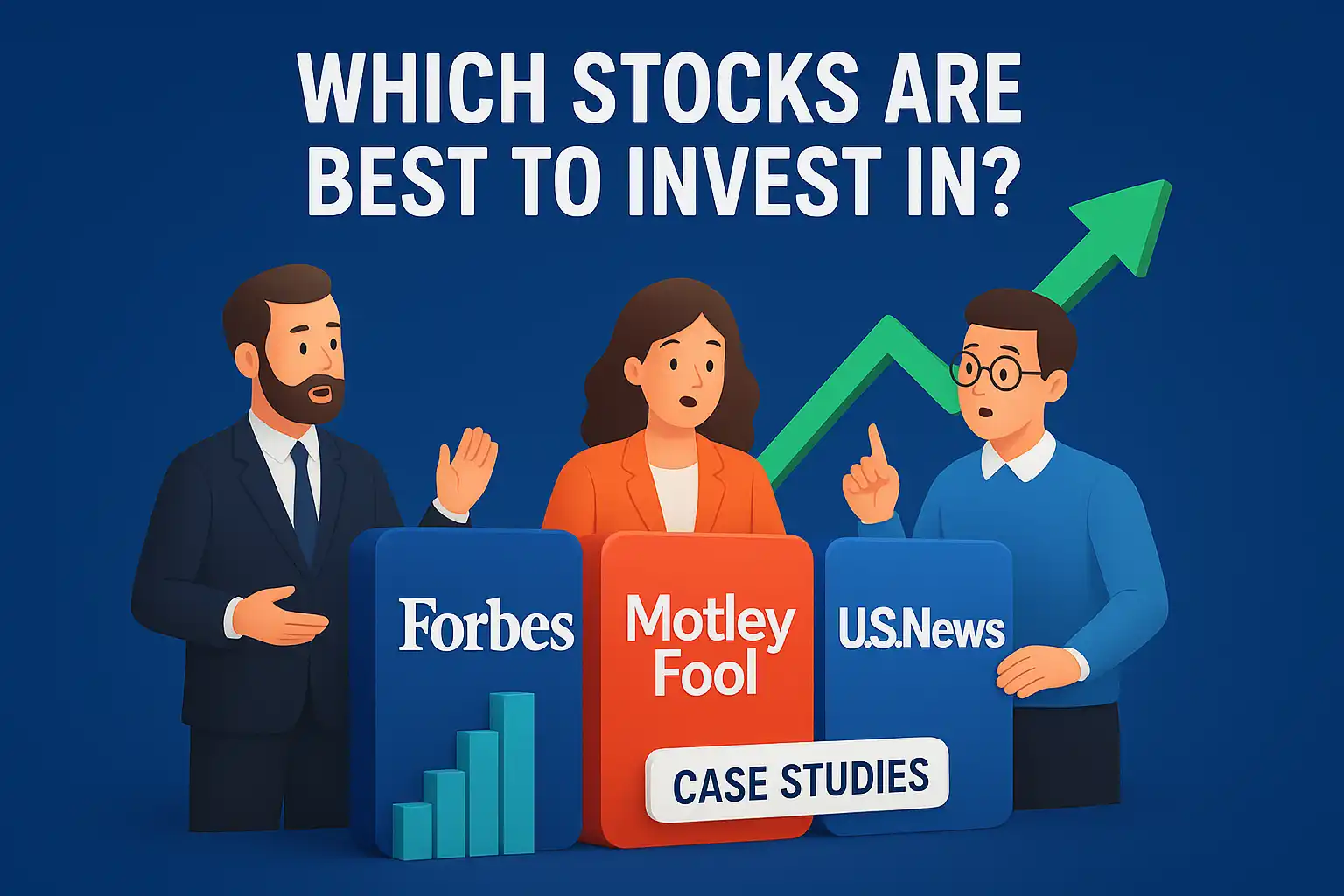
Related reads: Income Generation with Dividends, Understanding the Real Value of a Stock, and How to Make Money from Home with Online Trading.
Pros & Cons of Following Expert Opinions
| ✅ Pros | ❌ Cons |
|---|---|
| Provides depth and perspective on market moves | Experts can still be wrong — no strategy is flawless |
| Helps confirm or challenge your investment thesis | Information may lag behind fast-changing markets |
| Case studies give practical examples of success/failure | Overreliance can reduce independent thinking |
Next up: Key Takeaways, Pros & Cons, and FAQs — a final summary to help you act with confidence.
Key Takeaways, Pros & Cons, and FAQs Final Insights
We’ve compared Forbes, Motley Fool, and US News across methodology, track record, and case studies. Here’s a final recap to help you decide how to apply these insights in your own investing journey.
Key Takeaways
- Forbes: Great for defensive, dividend-paying stocks and stability during recessions.
- Motley Fool: Best for growth investors who can handle volatility and think long-term.
- US News: Solid for data-driven, consensus-backed picks that balance risk and reward.
- Blending strategies may give you a barbell portfolio with both defensive anchors and growth engines.
Overall Pros & Cons
| ✅ Pros | ❌ Cons |
|---|---|
| Multiple perspectives reduce single-source bias | Conflicting advice can confuse new investors |
| Combining strategies creates stronger diversification | Analysis may lag behind fast-moving markets |
| Case studies validate real-world effectiveness | Requires discipline to filter hype from substance |
“In investing, what is comfortable is rarely profitable.”
Frequently Asked Questions
Which is more reliable: Forbes, Motley Fool, or US News?
Each has strengths: Forbes for stability, Motley Fool for growth, and US News for balanced picks. Reliability depends on your goals and risk tolerance.
Are these stock picks suitable for beginners?
Yes, but beginners should start small. Consider learning the fundamentals before following any stock-picking service.
How often should I rebalance my portfolio?
Most experts recommend reviewing quarterly or semi-annually. Over-trading can erode returns, but ignoring balance can increase risk exposure.
High Authority Resources
High-Authority Resources for Smarter Investing
Explore trusted external resources to deepen your understanding of stock research, analysis, and investing strategies.
About the Author
Evan O’Hara is an experienced trader and founder of TradeStockAlerts.com, specializing in day trading, swing trading, and portfolio diversification strategies. With over a decade in the markets, Evan shares actionable insights backed by real performance.
📅 Last Updated: